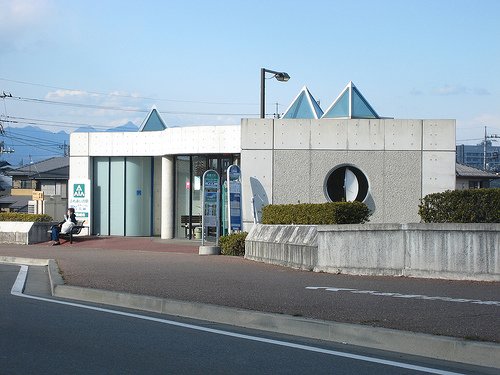It was Thomas Paine — a possible ancestor of mine, although I somehow doubt it — who uttered the words, “These are the time that try men’s souls.” Strike the word “men” and insert “gaijin” and you know what it’s like to be sick in a country like Japan. Although I resisted as best I could, it seems I’ve managed to pick up the bug that my wife and daughter had, and now I’m pecking away at the computer while wearing one of those Japanese health masks, and feeling quite miserable. No matter how much I may like Japan, one of the fundamental rules of human beings is that when you’re feeling under the weather, you want familiar remedies that you know will work. Japan has plenty of cold and flu medicines on the market, with names like Benzablock, Paburon, Ruru and even a local version of Contac, but they just don’t seem be strong enough for my oversized American body. There are differences in how medicines are sold, too — I’ll never forget the first time I got sick in Japan, trekking feverishly to the supermarket to buy medicine because that’s where you go in the U.S., then being told that I had to find a drug store instead. Happily, I always keep a small stockpile of American medicines in the house, from Nyquil to Dimetapp and Vicks Vapor Rub and so on, so hopefully I’ll be okay in no time.
Without a doubt, one of the most famous words of Japanese is baka, the all-purpose insult that takes the place of many more anatomically colorful words in English. Meaning “stupid” or “idiot,” the word is used by Japanese of all ages, from three-year-olds to the elderly. Someone nearly hits your car in an intersection? Let fly with a baka yaro! (“stupid jerk!”). Your gaijin husband who shall remain nameless mistakes a mimikaki ear scoop for one of those spoons used in Japanese tea ceremony? The proper response to this would be, baka ja nai? (“what are you, stupid?”). The word is also used to describe someone who goes overboard with love of something, like “oya-baka,” parent-fool, the word for mothers and fathers who are absolutely ga-ga over their own kids; and “tsuri-baka,” meaning fishing-fool, someone who likes to fish so much that he does it whenever he can. The word is also found in Japanese proverbs, like Baka ni tsukeru kusuri wa nai,” or there is no cure for stupidity.” The word baka (馬鹿) is written with the characters for “horse” and “deer” and there’s an interesting legend about how this word came to be. It seems that in ancient China there was an Emperor who was not very well liked by his retainers. One day, one of his underlings presented the Emperor with a deer, instead of a horse as was customary back in those days. When the Emperor pointed out that it was a deer, the man insisted that no, it’s a horse. He kept this up until he convinced his lord that the deer was, in fact, a horse, and thus Emperor became famous throughout the land for being so stupid that he couldn’t tell the difference between the two animals.
Another trait I respect about the Japanese is their tendency towards kinben (KEEN-ben、勤勉), or diligence and hard work. The famous image of an industrious Japanese salarymen is one that everyone is familiar with, but children in Japan are encouraged to work hard, too, with a general culture that expects kids to put in 1-2 hours of studying per evening, on top of any juku night classes they may attend. Several times a week there are quiz shows that aim to interest the minds of young people, like Test the Nation, which presents questions to viewers and lets them keep track of their own scores. We’re big fans of TV Champion, a show that usually pits teams against each other doing things like baking bread in the shapes of famous buildings or making works of art out of origami. Last night’s episode involved four very smart kids who underwent an amazing battery of quiz questions before a winner was finally determined, and our whole family was hanging on every question. One of my favorite food items sold by J-List are Shigekix (shi-geh-kicks), super tart “hard gummy” candies in flavors like lemon, cola and ramune. In their newest series of TV commercials, which I’ve posted in the product descriptions on the site, a strange but irresistible girl in a yellow dress sings a song inside the brains of students, tying the BCAA Amino Acids and Gaba in their products and the stimulation of the tart taste to students hoping to do better in their studies.
















